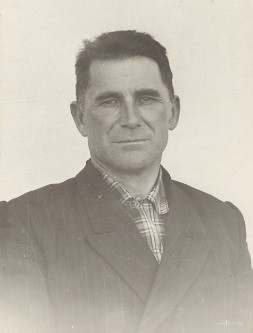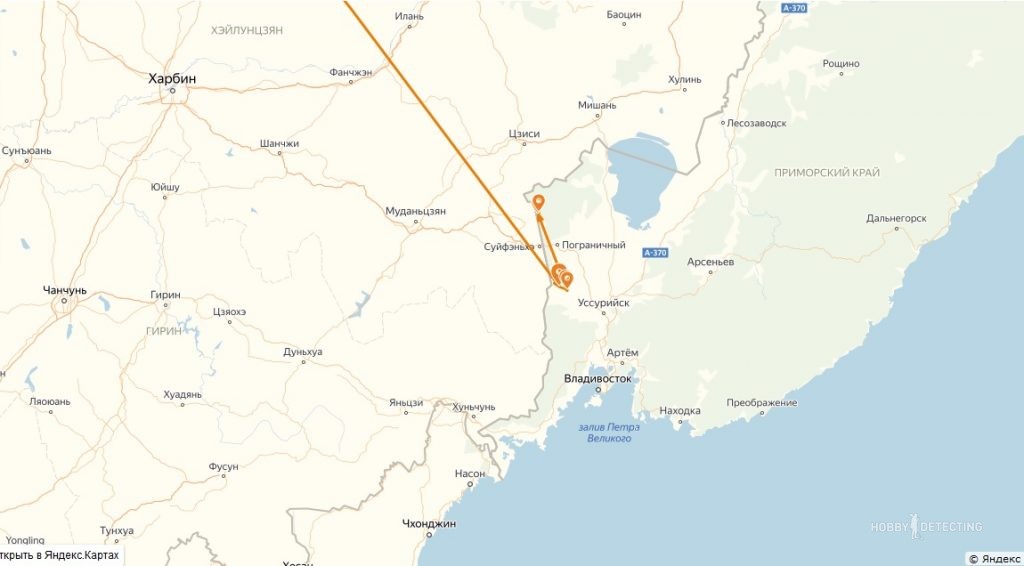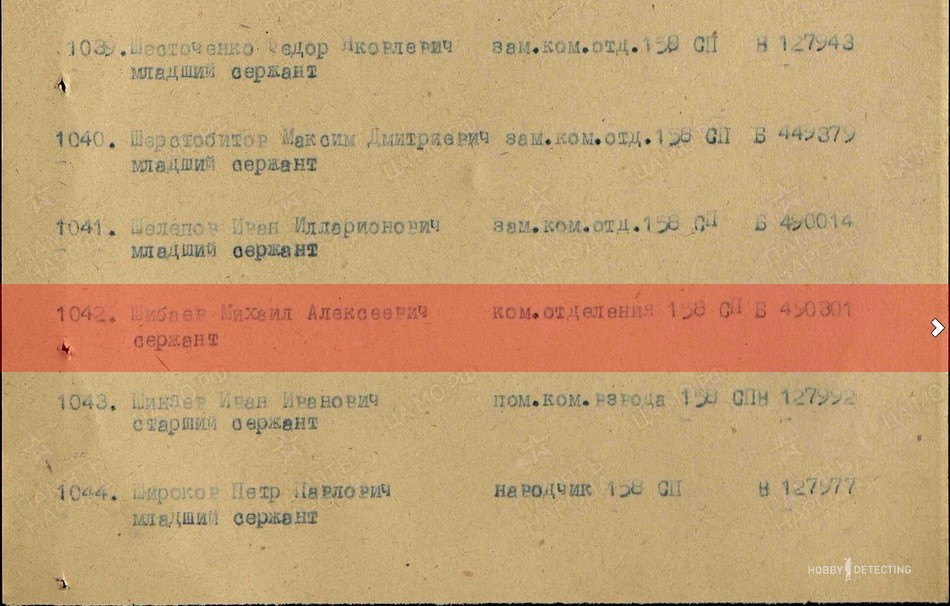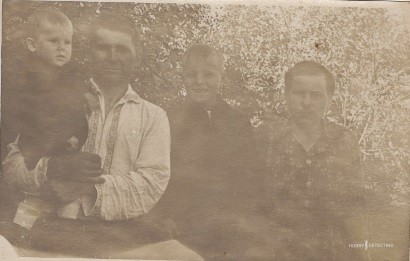“MY FAMILY HAS BEEN AFFECTED BY THE WAR”
(WWII participant — Shibaev Mikhail Alekseevich)
This year marks the 75th anniversary of the Victory in the Great Patriotic War (1941-1945) – the heroic feat of our ancestors, without which there would be neither us nor our country. War is a terrible time, a lot of people died. Grief touched every family, relatives and friends went to the front, of which only a small part returned home.

WWII participant — Shibaev Mikhail Alekseevich
As part of the school project “The war touched my family,” I would like to talk about my great-grandfather Mikhail Alekseevich Shibaev, a participant in the Great Patriotic War.
He was born on August 20, 1922 in the village of Troitsa, Spassky District, Ryazan Region. Father — peasant, worked in St. Petersburg as a porter delivering various goods, mother — a servant in a rich family there in St. Petersburg. It turned out that my great-grandfather’s parents — fellow countrymen at their place of birth met in St. Petersburg, where they went to work, after which they got married and moved to live back in the village. Trinity.
My great-grandfather had a very difficult childhood. At the age of 5, he was left without a mother, who died suddenly of typhus. He was raised by his stepmother Matryona Vasilyevna. Father, Aleksey Terentyevich Shibaev (1987-1970), was a tough man, he even headed the local Committee of the Poor (he was its chairman) during the years of dispossession after the 1917 revolution. There wasn’t enough money, sometimes there was simply nothing to eat, since first of all everything went to the stepmother’s children — Klava (born 1933) and Volodya (born 1937), and little Misha and his sister Nina (born 1920) from their father’s previous marriage – already on a residual basis.

Painting “Interrogation at the Committee of the Poor.” Artist Ivan Vladimirov.
Alexey Terentyevich, by the way, played the guitar and sang well. People said that his voice flowed smoothly, like water from a watering can, and among themselves they nicknamed him “Leika.” And the great-grandfather became “Leikin”, because Leikin’s son. This is how, with the help of local residents, Shibaev Mikhail Alekseevich acquired a “street” surname. The fact is that some people (in many villages) had not one, but two surnames: one official – for documents; the other unofficial one is for the street. Additional surnames were needed to differentiate (distinguish) many relatives with the same surname living in a limited territory. As a result, it so happened that all the descendants of the great-grandfather in the village of Trinity are known by their street name “Leikins” and are sometimes very surprised when they recognize the real one.
My great-grandfather’s father, Alexey Terentyevich, knew how to sew hats, mittens, felt boots, work on leather, process animal skins, and weave baskets of any size. The stepmother took her handicrafts to sell at the Yasakovo railway station in the village of Troitsa. The father taught his son Misha the same craft. And then, like a bolt from the blue, the war began…

Battle path 158 s.p. 190 s.d. (II) the Red Army, where Mikhail Alekseevich Shibaev served
In 1941, at the age of 19, Mikhail Alekseevich Shibaev went to the front as a private. He was transferred to the Far East, where he fought with the troops of militaristic Japan (Kwantung Army). Consists of the 158th Infantry Regiment of the 190th Infantry Division (II formations) of the Red Army participated in the Sungari offensive operation (August 9 – September 2, 1945), according to as a result of which USSR troops completely liberated the northern and northeastern parts of Manchuria (historical region in northeast China) from the Japanese.
During this offensive operation, the squad commander, Sergeant Shibaev Mikhail Alekseevich, showed himself heroically. With his detachment, under heavy enemy fire, he suppressed the Japanese firing point and captured the most important hill. For which his superiors promised to nominate him for the “For Courage” award, but his great-grandfather never received this award.
A few days later they suggested that my great-grandfather and his squad take another hill, on which the next Japanese firing point was located. But before that, the company commander forbade his great-grandfather to enter into hostilities without his personal permission. And it so happened that for some reason it was not possible to find the company commander, but it was impossible to disobey him. Therefore, soldiers from another squad went to take the hill with the Japanese. As a result, they were all killed and significant forces of the Red Army had to be deployed to suppress this enemy firing position. It turns out that the company commander was not there and there was no one to ask for approval, saved my great-grandfather from death. Apparently fate wanted it that way.

Act of presenting medals “For Victory over Japan”

Act of presenting medals “For Victory over Japan”
After the war, tens of thousands of soldiers, who for various reasons did not receive the awards to which they were presented during the battles of the Great Patriotic War, were awarded the Order of the Patriotic War.< /p>
Shibaev Mikhail Alekseevich was awarded the Order of the Patriotic War II degree, providing for 25 different combat situations.

Awards of Mikhail Alekseevich Shibaev
In addition, for his participation in the Great Patriotic War, his great-grandfather also received the medal “For Victory over Japan” and the medal “For Victory over Germany.” He was awarded the Zhukov Medal and many other various anniversary medals as a veteran of the Great Patriotic War.
Great-grandfather told an interesting story about how he came home. It was already a September evening. He knocked on the window, the curtain moved aside, the stepmother looked out, opened the window and called out: “Who came?.” The great-grandfather jokingly asked: “Let me spend the night, good people?.” The stepmother did not recognize him in the dark (and even in military uniform) and muttered that we could not help, there was no room. And his father, Alexey Terentyevich, lying on the stove, says: “Are you stupid, can’t you hear your voice? It’s Mishka who has returned from the war!”

Shibaev Mikhail Alekseevich and wife Nadezhda Petrovna with sons Vitya and Volodya
Returning from the war, Mikhail Alekseevich Shibaev in 1947 married the granddaughter of a former local merchant Kuzina Nadezhda Petrovna (03/07/1926 – 10/04/2016), who during the war at the age of 15 worked in the rear on a tractor during the harvest. In their marriage, they had two children: Shibaev Viktor Mikhailovich (born 09/08/1948) – currently lives in St. Petersburg and my grandfather Shibaev Vladimir Mikhailovich (born 01/22/1955) — currently lives in Ryazan.
My great-grandfather really did not like to talk about the war, but sometimes, if he was in a good mood, he could tell his grandchildren (in particular my dad), after much persuasion, some war story of his life.
For example, in 1942, many divisions with all the weapons and equipment from the Far East were transferred to the Stalingrad Front. By some miracle, they didn’t touch my great-grandfather’s military unit, where he served.
Later it turned out that almost everyone who was sent from the Far East to Stalingrad died. Whether this is true or not, they say that it was then that the famous phrase, horrifying in its essence, was uttered, which historians attribute to Marshal Georgy Zhukov: “Don’t feel sorry for the soldiers, women are still giving birth!”
Thus, the USSR had practically no combat personnel and tanks left on the border with Manchuria. There was simply no one and nothing to hold back the Japanese if they went on the offensive.
And then, early one morning in the fog, a loud rustling sound in a wide strip was heard from the Japanese side. And we knew, says my great-grandfather, that the Japanese wanted to launch a massive offensive if the Germans took Moscow. Well, we think, the narrow-eyed ones went on the attack, have the filthy ones really captured the capital? We stand waist-deep in the grass with weapons in our hands, and behind us, instead of tanks, there are wooden dummies in haystacks to scare off the Japanese. We have already mentally said goodbye to our comrades in arms, we think our time has come to die… And it’s strange that for some reason they are coming without preliminary artillery preparation… And the Japanese are still not there, but the rustling sound is already close. And suddenly, snakes crawl between us. There were a lot of them. Apparently at that time they were going through some kind of rut or migration. Here we stand, looking at each other and thinking, it’s too early to die, we’ve gathered, let’s fight some more!
I remember another story about how my great-grandfather was covered with stones during Japanese artillery shelling. One day the Japanese decided to launch artillery fire at Russian positions. Several of our soldiers were killed, the rest left the affected area. And it so happened that my great-grandfather was covered with stones and earth almost up to his chest from the explosions, but he remained alive. When it was all over, none of his comrades were around, and the great-grandfather himself was unable to dig himself out. He began to call for help. I screamed for half a day, but to no avail. It was lucky that some boy happened to pass by this place and helped him free himself from the rocky trap. The great-grandfather returned to his soldiers, and they were so surprised, they said, he must be alive! They thought he died there.
Once upon a time, my great-grandfather and his squad decided to camp on a hill to eat. We settled down there and began to heat up the stew. Everyone laid out what they had from food supplies on a common makeshift table. As they say: “The richer you are, the happier you are!” And one soldier went down the hill and stepped aside to relieve himself. And thus I accidentally noticed a Japanese suicide bomber, hung with grenades, crawling towards the resting detachment. I wanted to blow them up along with myself. The soldier did not lose his head and shot the Japanese, thereby saving the others from certain death.
There were also funny incidents during the war. Twice my great-grandfather and his squad thought they were chasing Japanese scouts. They tracked them down, surrounded them and tried to capture them. But the first time the so-called “Japanese spy” turned out to be a bear, and the other time — a huge four-meter boa constrictor.
After the war, my great-grandfather first got a job as a simple worker on a state farm. From 1960 to 1967 he worked as the Manager of the commercial dairy farm of the Iskra collective farm. From the late 60s until 1982, he worked as a foreman of the field crew of the Luch state farm, while from time to time he filled the position of Manager of the Trinity branch of the Luch state farm. From 1970 to 1982, he was repeatedly elected as a deputy of the village council, and was also a member of the executive committee of the Trinity Village Council. He was a very respected man in the village.
His photograph hung on various boards of honor and distinction. During his career, he received many different awards and certificates. For many years of conscientious work, on February 14, 1983, he was awarded the Veteran of Labor medal.
Shibaev Mikhail Alekseevich loved discipline very much, was demanding of himself and subordinates, did not tolerate theft and actively fought against it. We still need to look for such hardworking and honest people!

Shibaev Mikhail Alekseevich
After retiring in 1983, he continued to do housework and babysit his grandchildren, whom he doted on. For example, every winter every Friday and Saturday evening, my great-grandfather took a sled (small sled), laid a sheepskin coat on it and went to the village railway station to meet his grandchildren from the train (little Roma – my uncle and little Denis – my dad). He didn’t know whether anyone would come to visit Trinity from Ryazan or not (there were no telephones), he often came back empty, but still, again and again, his great-grandfather went to the station and hoped that one of the little grandchildren would come to visit their grandmother and grandfather. But, if you only knew how much joy there was in his eyes when one of the long-awaited children suddenly jumped from the train onto the platform! He put them in a sled, wrapped them in a sheepskin coat and took them quietly to their native village house, where their grandmother was already eagerly waiting for them.
Great-grandfather died in 1997 at the age of 74 after a long illness caused by a massive stroke in 1994.
And on February 4, 2012, a little boy Mikhail Shibaev was born, that is, I, named after my famous ancestor. The memory of a person is alive as long as we remember and can talk about individual episodes of his life!
Pupil 1 “A” class of school No. 41
Shibaev Mikhail
P.S.: Dad helped a little!)))
